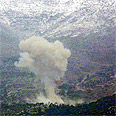
Return the Shebaa Farms
We should take advantage of Syria's agreement to hand over disputed land to UN control
Several days ago, Syria informed Spanish Foreign Minister Miguel Moratinos that it is willing to hand over the Shebaa Farms to UN control, or in other words, Damascus is willing to recognize the possibility that the area belongs to Lebanon rather than to Syria. Lebanon claims that this territory was always held by Lebanese villagers and this is the official reason presented by Hizbullah to justify the ongoing Lebanese struggle against Israel.
Up until now, Syria's refusal hindered the possibility of Israel returning the area to Lebanon, thus putting an end to the remnants of the border dispute between the two countries. Syria's agreement to hand over the Shebaa Farms to UN control enables us to advance on the Lebanese track.
One wonders why Syria chose to agree to this arrangement now of all times. Perhaps this move is perceived by the Syrian regime as part of the response to Israel's operation in Syria at the beginning of September: A move that would force Israel to give up another chunk of territory as punishment for infiltrating Syrian territory and causing damage. However, from an Israeli vantage point, this may be an opening to an interesting process.
We must declare explicitly at this time: We must not return the Shebaa Farms to Lebanon without negotiations, and the first thing we must demand in such talks is a Lebanese government declaration, and a parallel declaration by Hizbullah leaders, that upon the return of the Shebaa Farms, the territorial dispute between Lebanon and Israel would come to a complete end.
Without such explicit and unequivocal declaration, Hizbullah will continue to produce territorial reasons for an ongoing struggle, and veteran commentators are already familiar with an implied claim regarding Shiite villages in the Galilee that must be returned to Lebanon.
The wording of such declaration regarding an end to the territorial conflict would be part of a tough and tiring negotiations process, but we must not compromise on it.
Free soldiers as part of separate agreement
It is also important that we avoid demanding the return of abducted IDF soldiers Eldad Regev and Ehud Goldwasser in return for the Shebaa Farms. Israel must not create a precedent whereby we give up territory in exchange for captives – that would be a mistake we would end up paying for through long years of emotional blackmail.
However, irrespective of the official written agreement to be drafted between Israel and Lebanon with regards to the border issue, we must demand that the two abducted soldiers be returned immediately at that stage. Formally, we must prepare a parallel agreement that would see the abducted soldiers freed in return for Lebanese captives held in Israel. We must not compromise on this.
However, we must not promote illusions. Hizbullah would not be disarming in the wake of such agreement, and it will continue to find reasons for arming itself and looking for opportunities to abuse the Zionist entity. If a regional war breaks out against Iran and Syria, Hizbullah will attack Israel and bombard it with missiles, as it did in the past.
The importance of such agreement is that the moral basis presented by Hizbullah for attack will be completely lost, and as opposed to the past, the organization would no longer be able to declare within the domestic Lebanese arena that it is fighting the Lebanese war of liberation vis-à-vis the Israeli occupier.
This would be of great importance to the organization's status within Lebanon and undermine Lebanese motivation to stand by its side. In a historical long-term outlook, the question of justice and motivation is of the utmost importance.
Prof Dror Zeevi is lecturer at Ben Gurion University's Department of Middle Eastern Studies










